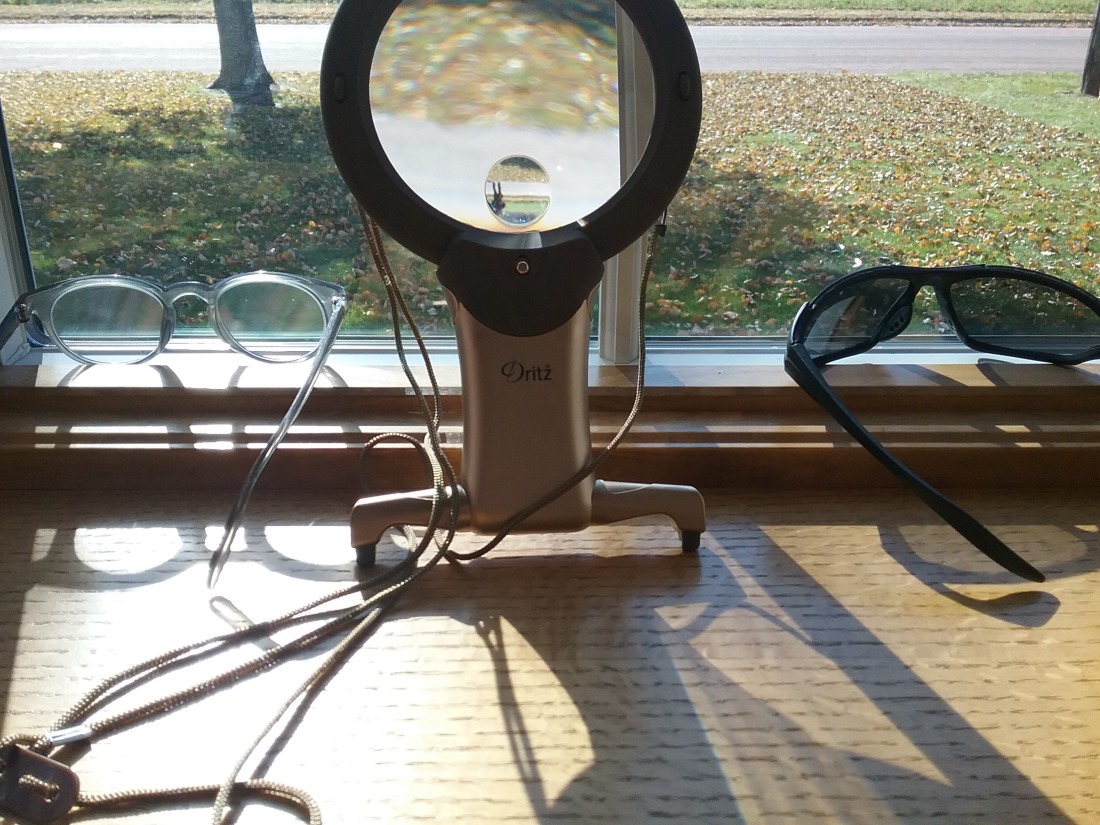Most of us wear some type of lenses at one time or another in our lives. Lenses are designed to alter our natural vision. Sometimes the vision is “corrected,” sometimes it’s magnified, sometimes it’s darkened, sometimes the colors are changed. It all depends on what lenses you’re using.
The lens we use changes the way we look at the world.

There are other kinds of lenses, too: lens of self, of our culture, of drugs or alcohol, our backgrounds, family, our church.
What kind of lens do you use?
As we grow up, we naturally use the lenses we are handed: the way our family interacts, how we are treated, things we learn, incidences that change our vision, and lenses we adopt to adjust our vision of ourselves and the world. Sometimes our lenses are smudged or cracked.

As teens, we delight in changing lenses often, swapping out with friends to see what the world looks like through different lenses. This often extends into young adulthood.
Eventually, we settle on lenses that “feel right,” that are comfortable. Our vision might change with circumstances such as marriage, children, death of loved ones; then we adjust the lenses we already have and hope to see more clearly. Some people just continue to use the same lenses they’ve had, even from childhood, and live with the blurriness of life.
In our natural state, we learn from and respond to those things which we see. The way we see things determines our response. The kind of lens we use becomes vital. If we’re not using a lens that provides clarity, we respond to a distorted image. Our response is distorted accordingly. Other’s perception of us includes our distorted response, filtered through their own clear or distorted lenses.
Do we watch television through cultural lenses?
Do we raise our children using our familial lenses?
Do we interact with others, in the workplace or in our community, through the lenses of self, or drugs or alcohol?
Things can get really messed up!
But God.
Isn’t there always a “But God?”
Yes. ~joyful smiley face~
But God gives us eyes to see. Before we come to know God through Jesus our Savior, we are spiritually blind. We cannot use spiritual vision at all. When we receive His Holy Spirit, God gives us new eyes. They are perfect eyes, but often and often we swap out for the lenses we are used to.

Have you ever put on someone else’s glasses? It can really mangle what’s out there! Reality is misinterpreted. When we don’t use the proper lenses, we see a skewed picture. We can stumble and fall over things we missed, or grab onto something that isn’t what we thought it was.
Every time we read His Word, God sharpens our vision. We can see through His eyes, feel with His heart, and receive life with clarity, undistorted by human perception. His Spirit can direct our eyes to zoom into important Bible passages, or needs of others; or He can color our natural perception with His love. He can give us x-ray vision to see through the facades others put on, and see into their hearts. He can show us cautions or open doors, spiritual forces that are invisible to human eyes. He can sharpen our perception of Who He is, causing us to fall on our knees before Him.
When you come to God’s Word, remove your lenses. Pray God to equip your vision with clarity. Try not to put any other lenses over God’s perfection while you read, or throughout your day. See the world through God’s eyes. You have His eyes. Use them.
This is a spot-on analogy that really made me think about the lenses that I have used in the past that still affect the way I look at things today. I’m re-blogging because it’s worth others taking the time to read it. Thank you!
LikeLiked by 2 people
Thanks, Vickie! 😊 Glad it spoke to you. It sure did speak to me.
LikeLiked by 1 person
Amen!
LikeLiked by 2 people
Isn’t it something, how God shows ya stuff?
LikeLike
Great post!!
LikeLiked by 1 person
Thanks John. When this idea popped into my head, I had to really chew on it. But I got all excited about the ramifications.
LikeLiked by 1 person
I know that feeling!!
LikeLiked by 1 person
See the world through God’s eyes indeed. The lens with nothing miss, nothing broken! Well said!
LikeLiked by 1 person
Thank you, Warren. I think it’s amazing what God shows us; I love it even more when I have the eyes to see. 😊
LikeLiked by 1 person
Indeed, God bless!
LikeLiked by 1 person
I LOVE the way you mingled looking through lenses and God’s word, so very well done Kathy!
LikeLiked by 1 person
Thank you, Wendi. This was one of those pretty much straight from His Spirit to the keyboard. 😊
LikeLiked by 1 person
that makes it even more special! 🙂
LikeLiked by 1 person
Wonderful post, Kathy. Thank you!
LikeLiked by 1 person
Glad it was a blessing to you. 😊
LikeLiked by 1 person
It was!
LikeLiked by 1 person
“But God”… That one gets me every time. Beautifully put, Kathy. I’m catching up with what I’ve missed.
LikeLiked by 1 person
Yeah. “But God” prevails, in glory, every time. 😊
LikeLike